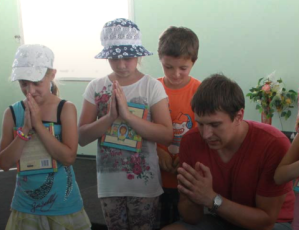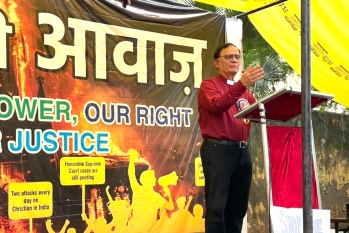
Horrific human rights abuses of evangelical Christians by Russian authorities illegally occupying territories in Ukraine have been documented in a report released earlier this year.
At least 47 Ukrainian Christian leaders of different denominations were “killed as a result of Russia’s full-scale aggression” from 2022 to 2024, according to Mission Eurasia’s February report entitled, “Faith Under Russian Terror: Analysis of the Religious Situation in Ukraine.”
“The causes of death for Ukrainian religious leaders varied: torture by Russian military personnel, detention or imprisonment in inhumane conditions, targeted shootings of civilians by Russian soldiers, indiscriminate shelling of civilian infrastructure using artillery, missiles, or weapons of mass destruction, as well as explosive-laden drones deployed by Russia across all regions of Ukraine, among others,” the report stated.
Data for the deaths of Christian leaders by torture “and inhuman treatment” in Russian prisons is incomplete, the report noted, because of the ongoing conflict and lack of access to occupied territories. Analysis by Mission Eurasia, a U.S.-based non-profit, also did not include the deaths of clergy either mobilized or volunteering to defend the country by joining the Armed Force of Ukraine.
Neither do the deaths recorded include “proactive believers who served in churches and faith-based communities without being ordained clergy.”
The report involved 70 in-person interviews with witnesses from all Christian denominations in Ukraine between August 2023 and December 2024.
Evangelical Christians are particularly subjected to threats, surveillance, defamation and “brutal violence” by Russian occupiers, stated the report.
“They are victims of Kremlin propaganda and its so-called ‘desatanization’ campaign, which disproportionately targets Protestant churches by labeling them as ‘sectarians,’ ‘Western agents,’ or ‘extremists,’” the report noted.
It compared the treatment of evangelicals by the current Russian Federation with that of the prior Soviet Union.
“As in Soviet times, occupation authorities forcibly consolidate believers from different denominations into a single church under the control of a state-approved leader loyal to Russia, effectively suppressing denominational diversity and freedom of worship,” it noted. “Russian forces frequently raid places of worship during services, turning church gatherings into sites for ‘filtering’ – a practice used to identify and intimidate those opposed to the occupation or unwilling to accept Russian citizenship.”
Explaining the background to Russia’s invasion on Feb. 23, 2022, following the land grab of Crimea in 2014, subsequently condemned as a “violation of the territorial integrity and sovereignty of Ukraine” by the United Nations, the report noted a sense of pluralistic cohesion between church denominations in Ukraine before the invasion. It compared the warm relations among Ukrainian churches with the militaristic call by the Russian Orthodox Church, led by Patriarch Kirill of Moscow, which “openly endorsed the full-scale invasion of Ukraine, framing it as a sacred war and encouraging societal support for aggression and the de facto genocide of the Ukrainian people.”
“Some Muslim, Protestant, and other religious leaders in Russia have expressed similar views,” the report added.
A “chauvinistic ‘Russian World’ ideology” has driven the invasion, which both denied Ukraine’s sovereignty as a nation and promoted Russian ethnic and cultural supremacy, according to the report.
“Backed by state propaganda and widespread societal support in Russia, this ideology has fueled war crimes against the people of Ukraine, including illegal imprisonment, torture, rape, mass kidnapping of kids to Russia, and targeted killings of civilians, including at least 47 Ukrainian religious leaders,” it stated. “Russia continues to violate international humanitarian law by systematically attacking civilian infrastructure – hospitals, schools, energy facilities, and places of worship – with missiles and drones.”
At least 650 religious sites had been damaged or destroyed, it stated.
Russian occupation forces in southern Ukraine have also systematically targeted all Christian denominations in the territory, putting pressure on them to “collaborate or eliminating them in cases of rejection,” it added.
Most church activities such as outreach efforts in communities and providing humanitarian aid were banned by occupation authorities by late 2022, after the initial phase of the main invasion. Religious services were also prohibited, and new churches or those involved in volunteer work had to register with Russian authorities.
The crackdown led to all independent faith communities in occupied Zaporizhzhia and Kherson regions shutting down by mid-2023, apart from “parishes forcibly aligned with the Russian Orthodox Church.”
The report’s executive summary noted the widespread confiscation and repurposing of religious property.
“Church buildings, properties, and even private houses of prayer were seized by Russian forces, declared ‘unclaimed,’ and then looted, destroyed or repurposed for use by the occupying regime,” it stated.
Christians who did not escape the Russian invasion in Ukraine have suffered systematic violations of their religious freedom and civil liberties. The report noted pressure on these Ukrainians to get Russian passports and Russian occupiers forcing faith communities to re-register under Russian law or lose both legal status and property rights.
“Hundreds more Ukrainian churches and faith-based communities face eradication,” warned the report, noting an additional risk to Ukrainian children in occupied zones: “The militarization of children and promotion of hate against anything non-Russian risks fueling future waves of Russia’s armed aggression, regardless of any temporary ceasefire or peace agreement.”
Church Leaders Killed
Among church leaders slain, on Jan. 22, 2024, during the Russian shelling of the Kurakhivka village in the Donetsk Region, the Rev. Mykola Fomin of the UOC was killed.
Russian soldiers tortured and shot an OCU priest, the Rev. Stepan Podolchak, on Feb. 15, 2024 in Kalanchak village, Kherson Region. Two days earlier, they had abducted him from his home barefoot, with a bag placed over his head.
The Rev. Yuriy Klymko, a chaplain and pastor of the CEF Church of Jesus Christ in the city of Kupiansk, Kharkiv Region, was killed on Feb. 28, 2024. He died in his own church building following an explosion caused by a Russian FAB-500 bomb dropped on the city center.
On April 10, 2024, in the city of Chornomorsk in the Odesa region, Vitaliy Taranenko, a choir minister at the Resurrection Baptist Church (ECB), was killed during a Russian missile attack.
The Rev. Mykola Tatiashvili, pastor of the CEF Church of God, was killed on Aug. 13, 2023 in his home in the village of Stanislav, Kherson Region. That day, the Russian army shelled settlements in the Kherson region, claiming the lives of at least seven people.
The Rev. Mykola Palahniuk, rector and dean of the Bilozerka District, was killed on June 13, 2023, after shelling by Russian forces of the St. John the Forerunner Church of the UOC in the village of Bilozerka in the Kherson region. He had been distributing humanitarian aid on the church grounds to those affected by the flooding caused by the destruction of the Kakhovka Hydropower Plant when Russian artillery shelled the village from the left bank of the Dnipro River.
Among victims slain before 2023 was the Rev. Maksym Kozachyna, a priest for the Orthodox Church of Ukraine (OCU), who was pulled over at a checkpoint near Ivankiv village in the Kyiv region on Feb. 26, 2022. Russian soldiers forced the priest in his clerical clothing out of the car and then executed him by shooting.
Also documented was the death of Oleksandr Kysliuk, a professor at the Kyiv Orthodox Theological Academy of the OCU. On March 5, 2022, Russian soldiers shot him dead in his own yard in Irpin, Kyiv Region. That same day, Russian soldiers shot and killed OCU priest Rostyslav Dudarenko at a checkpoint in his hometown of Yasnohorodka, in the Byshiv community of the Fastiv District, Kyiv Region.
Russian soldiers executed by shooting Vitaliy Vynohradov, dean of the Kyiv Slavic Evangelical Seminary, in Bucha, Kyiv Region, on March 6, 2022; hundreds of other local residents were also “brutally murdered.”
In Bucha, the body of Ihor Horodetskyi, a minister of the Association of Missionary Churches of Evangelical Christians of Ukraine, was found in a mass grave; the date was not disclosed.
On Sept. 1, 2022, during the shelling of the city of Balakliia in the Kharkiv Region, Andriy Klyauzer, a pastor of the Ukrainian Church of the CEF, was killed while distributing food to local residents.
In the city of Kakhovka, Kherson Region, Russian soldiers tortured to death Anatoliy Prokopchuk, a deacon of the Ukrainian Church of the CEF, along with his 19-year-old son Oleksandr. Shortly after their abduction, their bodies were found on Nov. 22, 2022, bearing signs of torture.






